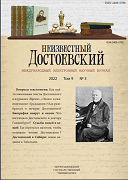Достоевский и Гинденбург: литературный текст в биографическом контексте
Dostoevsky and Hindenburg: a Literary Text in a Biographical Context
Author(s): Elena Yu. SafronovaSubject(s): Russian Literature, Theory of Literature
Published by: Петрозаводский государственный университет
Keywords: F. M. Dostoevsky; W. Hindenburg; F. P. Haaz; Dr. Herzenstube; S. E. Lurie; A Writer’s Diary; R. V. Pletnev; biography; obschechelovek; universal man;
Summary/Abstract: The article systematizes the known and forgotten facts about the life and work of Vasily (Wilhelm) Danilovich Hindenburg, a doctor from Minsk, a German by birth. The lifestyle and fate of this man were important for Dostoevsky in understanding such fundamental issues as the meaning of life, the role of a person in history, and the search for solutions to interethnic conflicts. Dostoevsky learned about Dr. Hindenburg from a letter from his friend Sophia Efimovna Lurie, a girl from a Jewish family, the daughter of a Minsk banker, a student of St. Petersburg Women’s Pedagogical Courses. Later, the writer devoted two sub-chapters of the Writer’s Diary from March 1877 to the description of the doctor’s story. The feat of Hindenburg, who has saved human lives during epidemics, childbirth, in prisons for 58 years, was seen by Dostoevsky as an example of Christian humility, a pledge of harmony and unity. The doctor’s funeral united all residents of Minsk, destroying age, class and ethnic borders. The Appendix contains a republication of R. V. Pletnev’s article “Dostoevsky and Hindenburg,” published in the emigrant newspaper “Rudder” (Berlin, February 6–7, 1931). This publication presents new information about the Minsk doctor from the memoirs of a witness to the events, his niece Sabina Samoilovna Daniel (nee Hindenburg). Pletnev also was the first to suggest that the image of the doctor Herzenstube in the novel “The brothers Karamazov” was created by Dostoevsky by combining the story of the Moscow doctor Нaaz and the story of Hindenburg. Author of the article, develops Dostoevsky’s ideas, also telling the story of Hindenburg’s friend, the Jewish philanthropist Zeldovich, to whom the doctor at his deathbed bequeathed to take care of all the poor. The doctor’s active and ascetic life became an example of true service to man and humanity for Dostoevsky.
Journal: Неизвестный Достоевский
- Issue Year: 9/2022
- Issue No: 3
- Page Range: 78-115
- Page Count: 38
- Language: Russian

